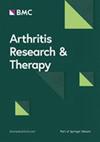Transforming growth factor beta (TGF-β) induces type 1 interferon signalling in systemic sclerosis keratinocytes through the chloride intracellular channel 4 (CLIC4)
IF 4.6
2区 医学
Q1 Medicine
引用次数: 0
Abstract
Systemic sclerosis (SSc) is an autoimmune disease, which is characterized by fibrosis of the skin, progressing to affect the internal organs in the most serve cases. Type 1 interferon (IFN) signalling plays a major role in SSc disease progression. The cytokine TGF-β has been extensively shown to be a major driver of fibrosis but its role in the induction of the type 1 interferon response is poorly understood. Type 1 IFN signalling was activated in keratinocytes using a range of agonists, IFN2α, Poly I:C, Poly dA:dT, LPS and TGF-β. CLIC4 activity was inhibited with the small molecule chloride channel inhibitors NPPB, IAA:94 and siRNA specific to CLIC4. Conditioned media collected from Healthy and SSc dermal fibroblasts was used to stimulate keratinocytes. TGF-β stimulation induces a type 1 IFN response in keratinocytes, dependent on the chloride intracellular channel 4 (CLIC4). Inhibition of CLIC4 via small molecule inhibitors or siRNA attenuates TGF-β mediated activation of Signal Transducer and Activator of Transcription 1 (STAT1) in keratinocytes. Further analysis revealed SSc dermal fibroblasts induce a type 1 IFN response in keratinocytes in part through a TGFβR1-CLIC4 axis. This study shows the ability of CLIC4 to enhance TGF-β signalling is essential for aberrant type 1 interferon signalling in SSc skin.转化生长因子β (TGF-β)通过氯离子胞内通道4诱导系统性硬化症角质形成细胞中的1型干扰素信号传导
系统性硬化症(SSc)是一种自身免疫性疾病,其特征是皮肤纤维化,在大多数病例中进展到影响内脏器官。1型干扰素(IFN)信号在SSc疾病进展中起主要作用。细胞因子TGF-β已被广泛证明是纤维化的主要驱动因素,但其在诱导1型干扰素反应中的作用尚不清楚。1型IFN信号在角质形成细胞中被一系列激动剂激活,包括IFN2α、Poly I:C、Poly dA:dT、LPS和TGF-β。小分子氯离子通道抑制剂NPPB、IAA:94和CLIC4特异性siRNA可抑制CLIC4活性。从健康和SSc真皮成纤维细胞中收集的条件培养基用于刺激角质形成细胞。TGF-β刺激诱导角质形成细胞的1型IFN反应,依赖于氯离子细胞内通道4 (CLIC4)。通过小分子抑制剂或siRNA抑制CLIC4可减弱角质形成细胞中TGF-β介导的信号转导和转录激活因子1 (STAT1)的激活。进一步分析显示,SSc真皮成纤维细胞部分通过tgf - β r1 - clic4轴诱导角质形成细胞的1型IFN反应。本研究表明,CLIC4增强TGF-β信号传导的能力对于SSc皮肤中异常的1型干扰素信号传导至关重要。
本文章由计算机程序翻译,如有差异,请以英文原文为准。
求助全文
约1分钟内获得全文
求助全文
来源期刊

Arthritis Research & Therapy
RHEUMATOLOGY-
CiteScore
8.60
自引率
2.00%
发文量
261
审稿时长
14 weeks
期刊介绍:
Established in 1999, Arthritis Research and Therapy is an international, open access, peer-reviewed journal, publishing original articles in the area of musculoskeletal research and therapy as well as, reviews, commentaries and reports. A major focus of the journal is on the immunologic processes leading to inflammation, damage and repair as they relate to autoimmune rheumatic and musculoskeletal conditions, and which inform the translation of this knowledge into advances in clinical care. Original basic, translational and clinical research is considered for publication along with results of early and late phase therapeutic trials, especially as they pertain to the underpinning science that informs clinical observations in interventional studies.
 求助内容:
求助内容: 应助结果提醒方式:
应助结果提醒方式:


